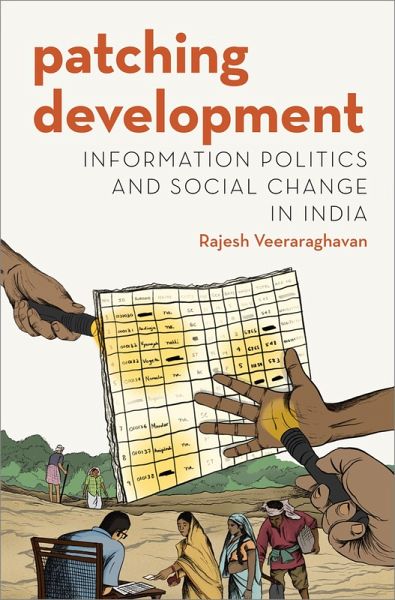
Patching Development (eBook, PDF)
Information Politics and Social Change in India

PAYBACK Punkte
6 °P sammeln!
Diving into an original and unusually positive case study from India, Patching Development shows how development programs can be designed to work. How can development programs deliver benefits to marginalized citizens in ways that expand their rights and freedoms? Political will and good policy design are critical but often insufficient due to resistance from entrenched local power systems. In Patching Development, Rajesh Veeraraghavan presents an ethnography of one of the largest development programs in the world, the Indian National Rural Employment Guarantee Act (NREGA), and examines NREGA'...
Diving into an original and unusually positive case study from India, Patching Development shows how development programs can be designed to work. How can development programs deliver benefits to marginalized citizens in ways that expand their rights and freedoms? Political will and good policy design are critical but often insufficient due to resistance from entrenched local power systems. In Patching Development, Rajesh Veeraraghavan presents an ethnography of one of the largest development programs in the world, the Indian National Rural Employment Guarantee Act (NREGA), and examines NREGA's implementation in the South Indian state of Andhra Pradesh. He finds that the local system of power is extremely difficult to transform, not because of inertia, but because of coercive counter strategy from actors at the last mile and their ability to exploit information asymmetries. Upper-level NREGA bureaucrats in Andhra Pradesh do not possess the capacity to change the power axis through direct confrontation with local elites, but instead have relied on a continuous series of responses that react to local implementation and information, a process of patching development. "Patching development" is a top-down, fine-grained, iterative socio-technical process that makes local information about implementation visible through technology and enlists participation from marginalized citizens through social audits. These processes are neither neat nor orderly and have led to a contentious sphere where the exercise of power over documents, institutions and technology is intricate, fluid and highly situated. A highly original account with global significance, this book casts new light on the challenges and benefits of using information and technology in novel ways to implement development programs.
Dieser Download kann aus rechtlichen Gründen nur mit Rechnungsadresse in A, B, BG, CY, CZ, D, DK, EW, E, FIN, F, GR, HR, H, IRL, I, LT, L, LR, M, NL, PL, P, R, S, SLO, SK ausgeliefert werden.













